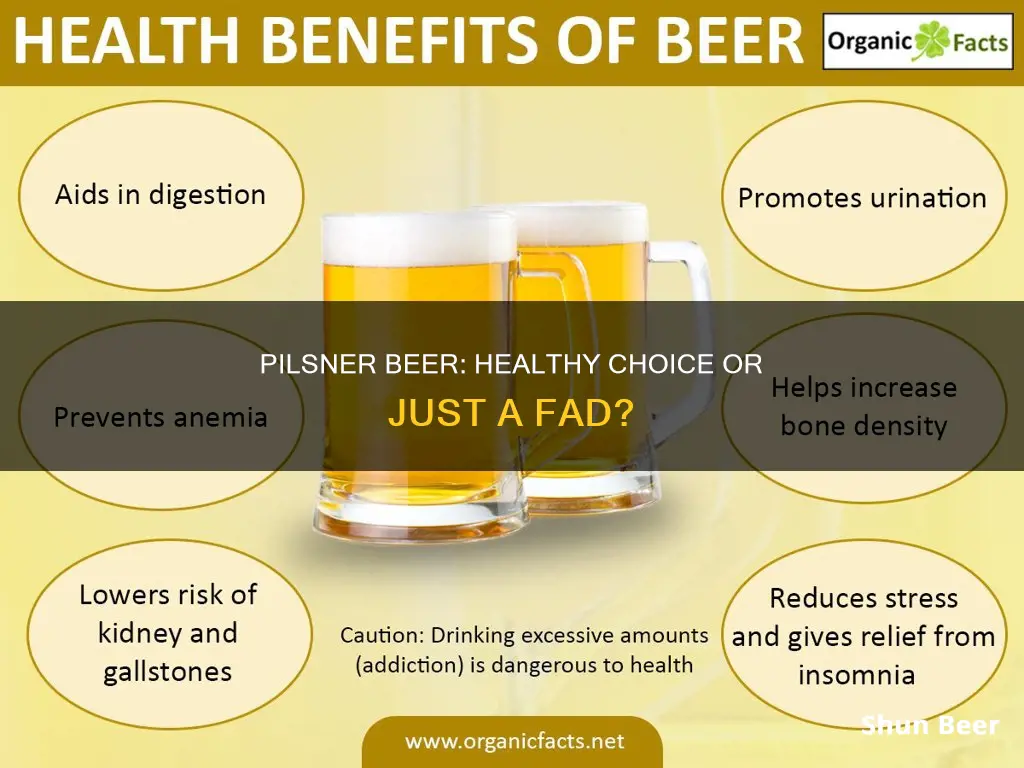
Beer is enjoyed by people all over the world and has been for centuries. But is beer good for your health? The answer is yes, when consumed in moderation. Beer is typically made from water, yeast, hops, and grains such as malted barley. One of the most popular beers worldwide is pilsner, a pale lager with a crisp, refreshing taste. But is pilsner healthy?
What You'll Learn

Pilsner is a lager with a distinct look and taste
The colour of a pilsner can range from pale to golden yellow, and it has varying levels of hop aroma and flavour. The alcohol strength of beers termed pilsner can vary but is typically around 4.5% to 5% ABV. The standard alcohol by volume measurement for a German-style pilsner ranges between 4.6% and 5.3%, but the flavour of alcohol is generally not detectable and does not play a role in its overall flavour profile.
The German-style pilsner is brewed from barley malt and has a limited list of ingredients, as dictated by The German Beer Purity Law (Reinheitsgebot). These ingredients include German noble hops, pilsner malt, lager yeast, and water. The hop flavour of a pilsner is moderate yet obvious due to the use of late hopping, which is the addition of hops during the latter part of the kettle boil. The medium to high hop bitterness in a German-style pilsner comes from the use of German noble-type hops.
Pilsner malt lends a sweet, malty residual aroma to the beer, and bready or light biscuity notes can be attributed to the addition of this malt. The German-style pilsner is known for its malty sweetness, which, along with its crisp finish, makes it a refreshing beer during the warmer months of the year.
Tequila vs Beer: Which Alcoholic Drink is Healthier?
You may want to see also

Pilsner is a natural source of B vitamins
Beer is made from natural ingredients, including malted cereals (most often barley), hops, yeast and water. Thanks to these, beer is a source of minerals, vitamins, fibre and polyphenols that can positively contribute to a person's diet. Beer is considered a fairly nutritious beverage, and in the early days of continental exploration, it was thought to have all the nutrients an explorer would need to stay healthy.
The primary vitamins in beer are usually B-complex vitamins. You can obtain between 5 and 10 percent of your daily value for vitamins like folic acid, niacin, riboflavin and vitamin B-6 in each serving of regular beer. B-complex vitamins are essential water-soluble nutrients that need to be consumed and replaced each day for you to stay healthy. They help your body make energy when you consume food and can also help prevent a variety of diseases. B vitamins are particularly well known for their role in helping maintain red blood cells in your body and keeping your nervous system healthy.
Small quantities of many B vitamins are available in beer, and their bioavailability has been confirmed by intervention research that has shown an increased absorption level of B vitamins with moderate beer consumption. Folate and homocysteine levels have been shown to be maintained in the normal range due to the high folate content in beer.
Pilsner is also known to create less gastric acid than other beers, which means less bloating.
Beer and Health: Six-Pack Abs or Problem?
You may want to see also

Pilsner creates less gastric acid than other beers
Beer is typically made from water, yeast, hops, and grains such as malted barley. There are many types of beer, including ales, lagers, IPAs, and pilsners. While beer is not a superfood and should be consumed in moderation, some types are considered to be healthier than others. Pilsner, for example, has some unique characteristics that set it apart when it comes to health.
Pilsner is a type of lager that was first brewed in the town of Pilsen (Plzeň) in the Czech Republic in 1842. It quickly gained popularity and became the most well-known style of lager. Pilsner is characterised by its crisp, refreshing taste and light hopping. It is brewed with pilsner malt and lager yeast, which is bottom-fermenting, resulting in a clean and simple beer. The head is white and dense, while the body is typically straw-coloured.
One of the key advantages of pilsner is that it creates less gastric acid than other beers. According to research from the University of Vienna, this quality leads to reduced bloating. This makes pilsner a good choice for those who are prone to indigestion or bloating after consuming other types of beer.
In addition to its effects on gastric acid, pilsner also has other potential health benefits that are common to beer in general. For example, beer is a good source of nutrients, including B vitamins such as folic acid, which is known to prevent heart attacks. Beer also contains anti-clotting ingredients that promote healthy veins and blood vessels. Furthermore, the hops in beer contain bitter acids, which have anti-inflammatory properties and can help prevent viral respiratory infections.
While pilsner may offer some health advantages, it is important to remember that beer should always be consumed in moderation. Excessive drinking can lead to negative consequences for both physical and mental health. Additionally, other factors such as diet, exercise, and overall lifestyle play a significant role in maintaining good health. Therefore, while enjoying a pilsner, it is crucial to prioritise balance and make informed choices that consider all aspects of wellness.
Hard Liquor vs Beer: Which is the Healthier Choice?
You may want to see also

Pilsner is brewed with lager yeast
Beer is typically made from water, yeast, hops, and grains such as malted barley. Pilsner is a type of beer that is brewed with lager yeast. Lager yeast is a specific type of yeast that is used to make crisp and clean-tasting beers.
A classic pilsner strain from the Czech Republic, this yeast produces a beer that is dry and malty. This type of yeast is well-suited for making thirst-quenching lagers such as Munich Helles, dunkels, and American lagers. Pilsner lager yeast has a fermentation temperature range of 50°-55° F (10°-13° C).
When it comes to health, beer has been found to have several benefits when consumed in moderation. These benefits include being a good source of nutrients, preventing inflammation, helping to build and maintain bones, and protecting the kidneys. Additionally, the foam on a pint of beer acts as a barrier for compounds that evaporate, such as hop oils, which can affect flavour.
So, is Pilsner healthy? While it's not a superfood and excessive drinking can lead to negative consequences, when consumed in moderation, Pilsner and other beers can provide some health benefits due to the ingredients they are brewed with and the fermentation process.
Pale Ale Beer: Healthy Choice or Not?
You may want to see also

Pilsner is best served cold
Beer is a popular alcoholic beverage made from water, yeast, hops, and grains such as malted barley. There are many types of beer, including ales, lagers, IPAs, and pilsners. While beer is not typically thought of as a healthy drink, drinking it in moderation can have some health benefits. For example, beer is a good source of nutrients and can help prevent inflammation and bone loss.
Pilsner, a type of pale lager, is best served cold, but not ice-cold. Serving pilsner at the correct temperature enhances its flavour and aroma. When pilsner is too cold, it numbs your tongue, reducing your sensitivity to flavours. On the other hand, warm beer can taste bitter because our taste buds perceive flavours more intensely in warm food and drinks.
The optimal temperature range for serving pilsner is between 38 and 45 degrees Fahrenheit (or 3 to 7 degrees Celsius). At this temperature, the beer is refreshing, yet flavourful. To achieve the perfect temperature, it is recommended to store pilsner at the top of the fridge, away from the cooling elements. Allowing the beer to warm up slightly before drinking can also enhance its flavour.
By serving pilsner at the ideal temperature, you can unlock its full potential and enjoy a well-rounded drinking experience. So, the next time you reach for a pilsner, remember that it's best served cold!
Two Beers a Night: Healthy Habit or Slow Poison?
You may want to see also
Frequently asked questions
In moderation, pilsner beer can be considered healthy. It creates less gastric acid than other beers, leading to reduced bloating.
The health benefits of pilsner beer include improved heart health, reduced inflammation, and bone health.
Pilsner beer contains natural antioxidants called phenols, which have been linked to improved heart function and reduced cardiovascular risk.
The hops used in pilsner beer contain bitter acids, which are powerful anti-inflammatory agents.
Yes, pilsner beer can help prevent kidney stones by increasing urine flow and diluting urine. Additionally, it may contribute to oral health by preventing the formation of biofilm and blocking bacterial growth that causes dental diseases.







